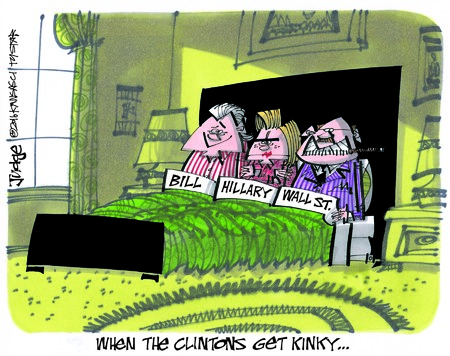
With apologies to Buffalo Springfield, there's something happening here. What it is ain't exactly clear.
Here's
The awful legacy of the last eight years? That'd be a strange thing for any Democrat to say, but it's particularly odd given that
Last year, she loved telling voters that she wasn't running as a continuation of Obama. But that was before
Also, as has been widely reported and dissected, Clinton's strategists concluded months ago that she had no choice but to embrace Obama and his policies, because Obama is popular with precisely the voters Clinton needs in order to assemble a winning coalition. These voters may think the country is on the wrong track, but they don't blame Obama for it.
That's one reason why Team Clinton has charged, sometimes hysterically, that Sanders is somehow attacking the president when he says, for instance, that Obamacare doesn't go far enough. The Clintonistas touted the fact that Sanders blurbed a book by left-wing writer
But now comes the former president attacking the Obama record head-on. The
No doubt he wouldn't put all the blame on Obama, but that's some odd messaging for a campaign looking to run on "four more years."
One obvious explanation is that the Clinton team has come to grips with the fact that the Sanders and Trump insurgencies are two faces of the same larger phenomenon. Huge swaths of the American electorate are fed up, ticked off and wildly disappointed with the direction of their country.
In a society so polarized along ideological lines, it's no surprise that partisans will have partisan explanations for why this is so. But the underlying conditions driving the discontent are in fact bipartisan. Anyone who listened closely to both the tea parties and the
As a conservative, I think the right-wingers have better remedies for the problem. In a nutshell, big corporations will always have the resources -- financial, political, legal, etc. -- to manipulate and navigate around regulations. Smaller firms simply can't handle the compliance costs of draconian regulations.
The result: Only the really big companies can survive and thrive, which in turn makes them "too big to fail." That's why community banks are being destroyed by Obama's policies: They can't carry the costs the way the big banks can, and, lacking connections and influence, they're small enough to fail.
In other words, if you think Big Business and Big Government are hugging each other too much, the last thing you should do is have government tighten the embrace.
But that's a policy argument for another day. And besides, the underlying problems with the economy are much larger than, and in some cases wholly unrelated to,
But as a political matter,
Comment by clicking here.
Jonah Goldberg is a fellow at the American Enterprise Institute and editor-at-large of National Review Online.



 Contact The Editor
Contact The Editor
 Articles By This Author
Articles By This Author